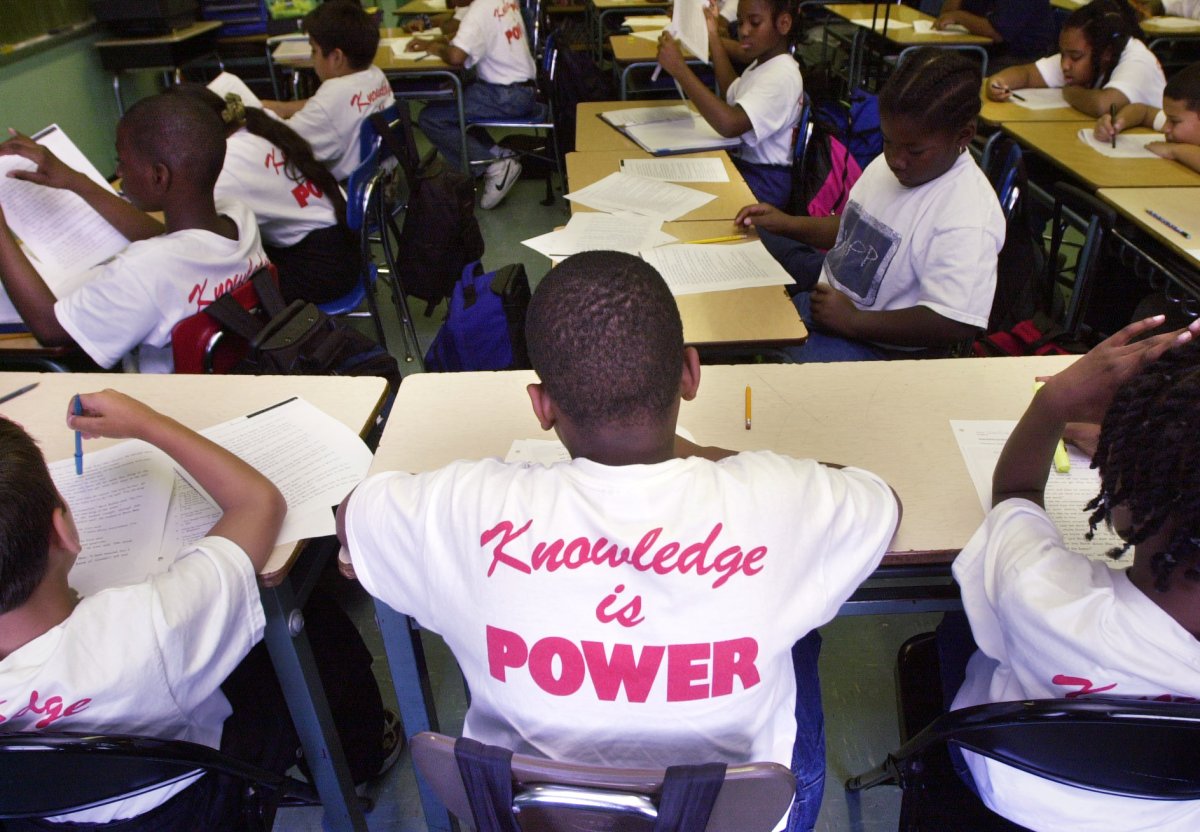President Donald Trump has threatened to penalize any U.S. schools that move ahead with plans to incorporate material from The New York Times' 1619 Project into their curricula.
The resource, named after the year that enslaved Africans were first brought to the Virginia colony, seeks to reframe American history with a focus on slavery and the contributions of Black Americans.
What the president may not realize, however, is that some of America's schools have already been using it for months.
On Sunday, Trump tweeted that the Department of Education would be looking into claims that California schools would soon be looking to use the 1619 Project to teach students about America's history of slavery.
If schools followed through with the plan, the president warned, "they will not be funded!"
Despite the president's apparent disapproval of the resource being used in California schools, Chicago's public school district—one of the largest in the country—has been openly using the 1619 Project in their curricula for some time.
In a September 2019 post announcing the decision to use curriculum material provided through the 1619 Project, Dr. Janice Jackson, the CEO of Chicago Public Schools (CPS), wrote that "every CPS high school will receive 200–400 copies of The New York Times' The 1619 Project" as a "resource to help reframe the institution of slavery, and how we're still influenced by it today."
"The stories we tell about our nation's history matter deeply, and the 1619 Project offers us a new set of stories by 'placing the consequences of slavery and the contributions of black Americans at the very center of the story we tell ourselves about who we are' through a collection of essays, stories, poems, and photography that marks the 400th anniversary of the beginning of American slavery," Jackson wrote.
"As educators, we are always looking for new tools and strategies to help students contextualize the world around them so they may one day become informed and effective citizens," the CPS CEO said.
"In order for our students to engage with the issues of today, it is essential that they have an honest accounting of our country's past," Jackson wrote. "The 1619 Project from the New York Times and the Pulitzer Center's supplemental curricular resources are compelling new resources that help us revisit slavery's impact on our modern society."
Months later, in early June, just days after the death of George Floyd rocked the nation, the Chicago Sun-Times reported on how students in the Chicago Public Schools system were learning "America's real history" with the help of the 1619 Project.
At one school, the Far South Side's Brooks College Preparatory Academy, students learned about America's history of slavery in an AP U.S. History class that the Sun-Times reported was taught through the 1619 Project.
One student, Arterah Griggs, said that after being exposed to the 1619 Project, she felt that she had been misled about the realities of Black history in the U.S. in middle school.
"In middle school they talked about slavery, but it was 'Christopher Columbus, he found us'," Griggs told the Sun-Times. "Now I read this and I know he didn't. We were the founding fathers. We put so much into the U.S. and we made the foundation."
It is unclear exactly how many schools in Chicago have incorporated the 1619 Project into their curriculums. However, at the time, schools had been using the resource as part of their programming for months, according to the local publication.
Trump's threat to pull funding from schools that incorporate the 1619 Project comes as detractors of the initiative point to criticisms from historians, with some prominent experts taking issue with some of the claims made through the project.
In a tweet, Texas Sen. Ted Cruz said the project was "filled with serious errors—which have been called out by top historians."
Historians have taken issue with a number of claims made in the project, including a claim made by journalist Nikole Hannah-Jones, who was awarded a Pulitzer Prize for her work on the project, asserting that a primary reason that "colonists decided to declare their independence from Britain was because they wanted to protect the institution of slavery".
New York Times magazine editor-in-chief Jake Silverstein eventually wrote an update to the project changing Hannah-Jones' essay to say: "Protecting slavery was a primary motivation for some of the colonists."
Despite the clarification, however, Silverstein has remained a staunch defender of the project, while civil rights advocates have also hailed the initiative as a critical retelling of America's history that brings the realities of the U.S.' legacy of slavery and the contributions made by Black Americans into focus.
Newsweek has contacted the CPS, as well as the White House and the Department of Education for comment.

Uncommon Knowledge
Newsweek is committed to challenging conventional wisdom and finding connections in the search for common ground.
Newsweek is committed to challenging conventional wisdom and finding connections in the search for common ground.
About the writer
Chantal Da Silva is Chief Correspondent at Newsweek, with a focus on immigration and human rights. She is a Canadian-British journalist whose work ... Read more
To read how Newsweek uses AI as a newsroom tool, Click here.








